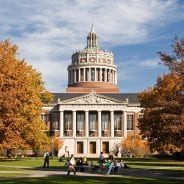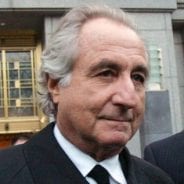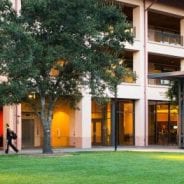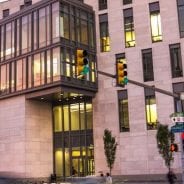Search results for career:
Simon Business School – University of Rochester
History
Originally founded in 1958, the University of Rochester began offering MBA degrees in 1962. Nearly two decades later, in 1986, it would be renamed as the William E. Simon Graduate School of Business Administration after famed entrepreneur, philanthropist, and former U.S. Treasury Secretary William E. Simon.
School Rankings
• U.S. News & World Report: 44 (tie)
• Bloomberg: 29
• Forbes: 42
• Financial Times: 76
• The Economist: 57
Locations
The main campus for the Simon Business School is located in Rochester, NY, on the River Campus of the University of Rochester.
Facilities
Simon Business School programs are taught at three main buildings: Schlegel Hall; James S. Gleason Hall; and Carol G. Simon Hall.
Schlegel Hall houses both a four-story classroom and student services, in addition to nine theater-style classrooms and 21 group study rooms. James S. Gleason Hall, linked directly with Schlegel Hall, is a 38,000-square-foot building that features five classrooms, 16 study rooms, and the recently updated Career Management Center suite. Carol G. Simon Hall houses the school administration, as well its faculty and the Ph.D. students. In addition, the building, which is also linked to the Schlegel and Gleason Hall buildings, features 75 offices, lounge spaces, and conference rooms.
Faculty
Approximately 98 faculty members are currently part of the University of Rochester Simon Business School.
Student Body
There are approximately 599 current full-time MBA students at the University of Rochester Simon Business School.
MBA Degree Offerings
The University of Rochester Simon Business School currently offers full-time, part-time, and Executive MBA program options, in addition to an MD/MBA and an MA/MBA. As well, the school offers four Master’s options in: finance; accountancy; marketing analytics; and business analytics.
The Big Payback: The Highest Paying Jobs for MBAs
Even in 2019, the search for the right MBA program is as unique as each student, and the reasons for applying are as varied as the programs themselves. Advancement in an existing career is an obvious motivation, as is breaking into a new industry or shifting one’s career focus.
One thing that all MBAs can likely agree with, however, is that earning potential is a leading incentive. This brings up questions about the most lucrative fields. Choosing the right concentration can be the first step toward achieving a position that will truly pay off. The following is a look at the current highest paying jobs for MBAs, as well as the majors that can open the necessary doors.
The Highest Paying Jobs for MBAs

Topping the list of the highest paid professions for MBAs in 2018 is strategic management. This specialization leads the way in terms of early to mid career salary, with salary averages beginning at around $125,000. Professionals with this degree and concentration earned $148,000 at the mid-point of their careers. Among the career functions for MBAs with a strategy focus are management consultant, senior strategy manager, senior product manager. Google, Amazon, PwC, and Intel are among the companies hiring for strategic management based positions.

Second on the list of highest paying MBA careers is technology management, which for many grows out of a background in IT or software development. According to Monster.com, tech management careers can start at around $113,000 per year, and advancement leads to a jump to upwards of $165,000. Roles such as senior project manager, vice president of IT, and IT director all emerge from a tech background. Companies such as Accenture, Deloitte, Cisco Systems, and HP all offer leading starting salaries in the IT management field.

Entrepreneurship also falls into the top three earning fields for MBAs. Starting salaries, according to data gathered from PayScale, hover around $100,000 per year, and reach up to around $135,000. Such roles as senior project manager and management consultant are options in the entrepreneurial field, as are various leadership roles in the growing fintech industry. Top hiring companies for entrepreneurship MBAs, according to PayScale, are Amazon, IBM, General Electric, and the Boeing Company.

A career in finance is the fourth of the highest paying categories for MBAs, with a starting salary hovering in the $100,000 range. Those with their sights upon chief financial officer, portfolio management, or financial management positions can hope to land jobs in this arena with high earning power. New York Life Insurance, Fidelity Investments, and Vanguard are currently seeking MBAs for various finance positions.

Along with strategy, tech management, entrepreneurship, and finance, marketing ranks among the most lucrative fields for MBAs. While some marketing jobs do not require an MBA, one can see a wider, more profitable range of options with a specialized study in marketing. Upper level marketing positions can start at around $80,000 per year, and can grow well above $120,000. Current listings for MBAs with a marketing focus include Dell, Microsoft, and, of course, Amazon.
HBS Examines the Allure of White-Collar Crime, and More – Boston News
Welcome back and a happy 2019!
Let’s explore some of the most interesting stories that have emerged from Boston business schools this week.
Interviewing White-Collar Criminals: 6 Tips from Harvard Business School’s Eugene Soltes – Journalist’s Resource
Denise-Marie Ordway from Journalist’s Resource recently profiled HBS professor Eugene Soltes, who’s 2016 book Why They Do It: Inside the Mind of the White-Collar Criminal surveys what “drove dozens of wealthy, successful businessmen to become white-collar criminals.”
Soltes offered six tips for journalists on how to build trust and develop rapports with potential sources behind bars.
- “Don’t lead with personal questions and questions that probe into the meatiest details of a convict’s crimes.”
- “Have a plan for whether and how you’ll use sensitive information that sources might divulge once they trust you.”
- “If you want prisoners to talk to you, write them a letter.”
- “When interviewing individuals who are incarcerated, choose phone calls over in-person meetings. You can develop a rapport more quickly through four 15-minute phone calls than one hour-long, in-person conversation.”
- “Establish a system of checking your biases to limit the impact your relationships with sources could have on your work.”
- “If you’re describing someone’s feelings, opinions or mindset, consider letting that person review what you have written to make sure it represents them accurately.”
You can read more from the Soltes profile on white collar criminals like Bernie Madoff in Journalist’s Resource.
Stocks & Bonds, Eggs & Bacon – Sawyer Business School
In early December, 2018, the first Summa Breakfast at the Sawyer Business School featured Amundi Pioneer Asset Management CIO Ken Taubes, MBA ’84, who offered his insights into “where the global economy has been and where he thinks it is going.”

A look inside the Summa Breakfast, held last month at Sawyer Business School / Photo via suffolk.edu
Taubes was surprisingly optimistic: “The dollar’s been strong, and the economy’s fine. In the macro sense for consumers, it hasn’t been this good in a long time.”
He also advises attendees to “turn off the noise and look for opportunities.”
You can read more about the recent Sawyer event here.
The Billionaire Next Door – Carroll School News
Boston College’s Joseph E. Corcoran Center for Real Estate and Urban Action recently hosted billionaire philanthropist Bill Cummings, a “model real estate developer with a strong conscience,” who spoke to roughly 70 BC community members.
After an overview of Cummings’ inspiring rags-to-riches story, along with a remarkable career ascent, he urged attendees to “do the things you want to do, and do them reasonably well.”
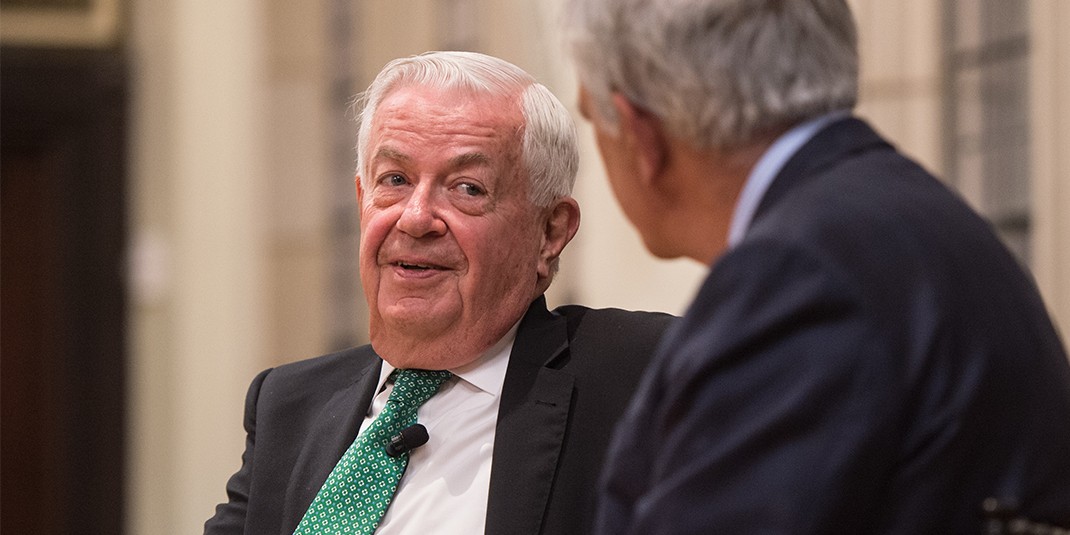
“An entrepreneur won’t find success by getting into a putatively lucrative industry that he’s not passionate about,” Cummings said at a recent BC event. / Photo via bc.edu
Cummings was recently honored as one of the Top 50 Givers by Forbes. The Cummings Foundation, according to the article, has “awarded more than $200 million to nonprofits in the Boston area.”
“The grants have made an impact near and far, from soup kitchens and homeless shelters in Essex, Middlesex, and Suffolk counties, all the way to Rwanda, where the foundation has established medical centers in collaboration with Boston-based nonprofit Partners in Health.”
Cummings closed with a paraphrased quote from dancer and actress Eleanor Powell:
“What we are is God’s gift to us. What we become, and what we do with our lives, is our gift to God.”
You can read more about Cummings here.
The Big Picture: The 5 Most Important MBA Numbers of 2018
Each year there’s a ton of new information that comes out about MBA programs. From new rankings to the latest GMAC news, there are a thousand little tidbits that can overwhelm applicants, students, and alumni. We’ve collected the most important MBA numbers of 2018.
To pare down the news into the information you need to know, we’ve taken a look at the big picture of the MBA for 2018 and outlined the five most important pieces of data you need to know. We’re talking about everything from the decline and U.S. MBA applications to the increase in female enrollment, the higher salaries and GMAT scores, as well as the increase in interest in technology. Continue reading…
Check Out New MBA Jobs at Walmart, Nike, and General Motors Before the New Year
Are you trying to get one more job application out before the end of 2018? Check out these exciting new MBA jobs at Walmart, Nike, General Motors, Johnson & Johnson and Procter & Gamble, and get those applications in. Soon you’ll be celebrating a new job as well as the new year! Continue reading…
5 Questions With the UC San Diego Director of Graduate Recruitment & Admissions
Sponsored Content
In our latest installment of the MetroMBA “5 Questions” series, we speak with Jay Bryant, Director of Graduate Recruitment & Admissions at the UC San Diego Rady School of Management. Bryant discusses the exceptional entrepreneurship culture at Rady and San Diego at large, plus what students hoping to join the UC San Diego MBA program should expect.
1. If you had to describe how Rady fosters entrepreneurship to someone who never heard of the school, what would you tell them?
“Rady is a school that was founded on the concept of innovation. It is our foundation—our very DNA! Innovation is the mother of entrepreneurship as I see it. All of our students come in with the passion of bringing new value to the world while the faculty, staff, and administration all foster an environment where the entrepreneurial spirit of our students can grow and practice their entrepreneurial interests in the safe and supportive environment of our school. As I see it, the top five ways in which the Rady School provides a perfect match for those wanting to pursue an entrepreneurially focused education are:
- Every class in our curriculum is designed for a student body driven by innovation and entrepreneurship.
- All of our students come into our program with a desire to be entrepreneurs or managers in the innovation economy. Therefore, students are always surrounded by collaborative and like-minded individuals that create the unique Ready School environment.
- The Lab to Market program—a three-course, capstone experience—gives students the opportunity to take an idea in any industry all the way from the mind of the student to ready to launch. Many of our students do actually launch their projects after graduation.
- The Rady School’s California Institute for Innovation and Development (CIID) allows for students to take part in a number of its initiatives designed to accelerate and promote innovation.
- The local San Diego community knows of the Rady School’s connection to innovation and entrepreneurship and therefore regularly works closely with us on capstone projects, internships, and career opportunities.”
2. Is there any particular kind of company or idea that tends to flourish in the program?
“Our students are trained to be part of the innovation driven economy, therefore, the companies that work most closely with us are those that have to reinvent themselves every year to stay relevant. The two largest sectors hiring our students are technology and bio-technology. In both of these sectors they seek managers who are excited to take on the new initiatives and new markets.”
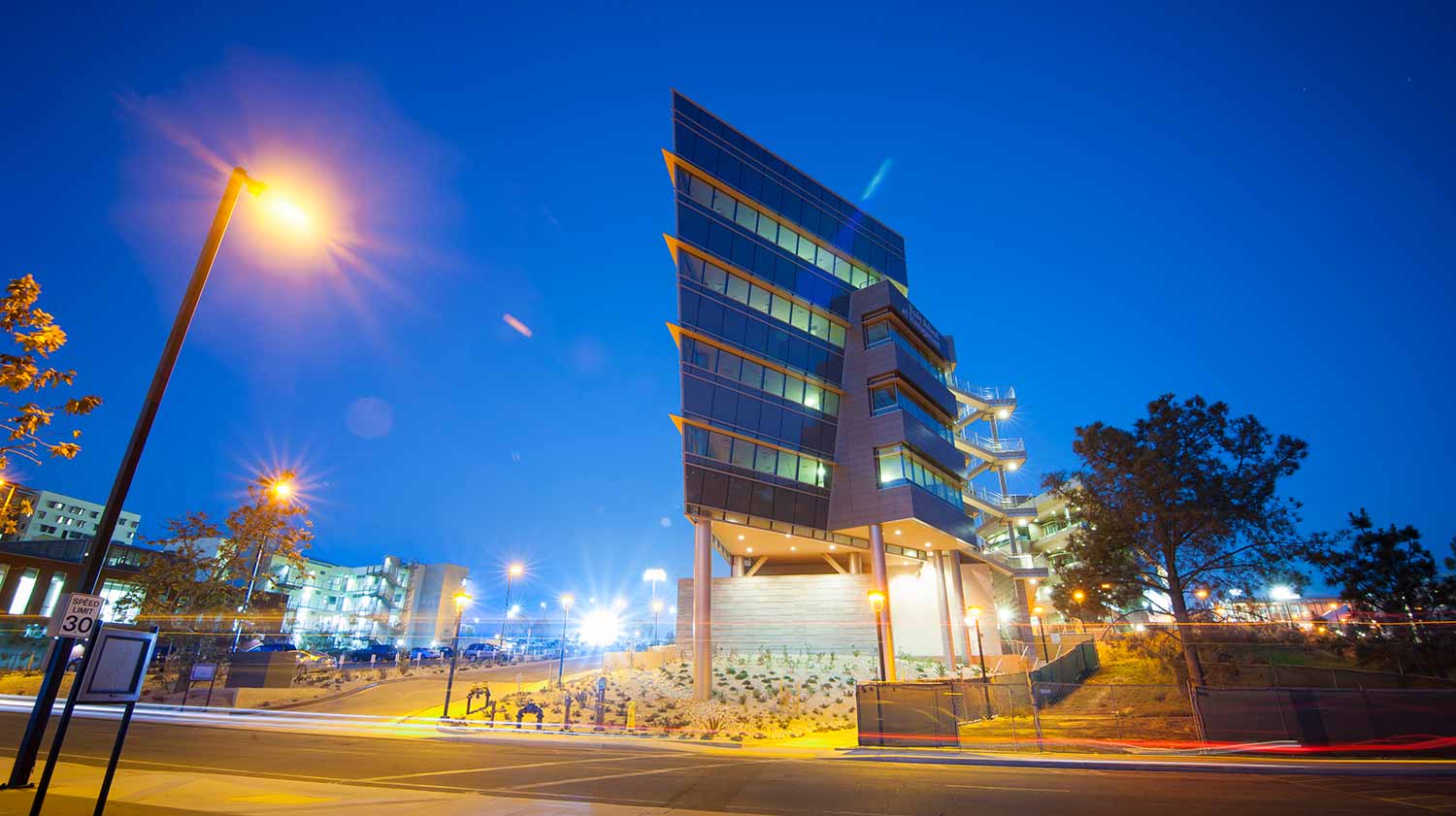
The three-year Rady Lab to Market program “gives students the opportunity to take an idea in any industry all the way from the mind of the student to ready to launch,” according to Bryant.
3. Is there something about San Diego specifically that tends to bring out the best in entrepreneurs?
“San Diego is consistently ranked among the best cities for startup companies. It is part of the spirit of California in general. Ever since the gold rush, California has been a state focused on the future and the new frontiers. Everywhere you look you find innovations that are coming from California—we literally create the future here in California. Innovation is not just an interest of the Rady School, rather it is in the spirit of the entirety of UC San Diego.”
4. What should hopeful students know about the program that they may not necessarily know until they start?
“I think what surprises students the most is entering into a community where everyone greatly values innovation. Through the admissions process we are searching for the individuals who will really fit the personality and passion of what we do. It is not until the first day of orientation do these selected individuals all wind up in the same place at the same time. Being surrounded by like-minded individuals only makes this passion grow over the course of their study.”
5. Is there any kind of student you want to see more of in the program?
“We believe that innovation comes from every industry. We are an appropriate program for individuals wanting to work at large organizations like Google or Tesla, but we are also appropriate for those wanting to start smaller ventures of their own. We want a well-rounded cohort of students that brings in the best from every industry, level of government, developmental or non-profit organizations, and any other entities where innovation drives their future success.”
To learn more about the UC San Diego Rady School of Management and the UC San Diego MBA, visit the school website.
Stanford GSB Employment Report Reveals Record Salaries & Employers
For the fourth year in a row, Stanford GSB MBA graduates earned record high salaries with the mean base salary reaching $145,559. According to the 2018 Employment Report, this broke last year’s record compensation. On top of that, this year Stanford GSB grads also received jobs from a record 421 organizations for both summer internships and full-time positions. This demonstrated the broad appeal and diversity of Stanford MBAs.
Tech and Private Equity Interest Jump
Other highlights from this year’s employment report included an increase in interest in the technology industry. In fact, in 2018 it was the most popular industry, garnering 33 percent of alumni—an 8 percent jump from last year. Other top industries included finance, which garnered 31 percent of graduates with private equity being the most sought after area with 13 percent of graduates.
Since three years ago, the percentage of women going into private equity and venture capital has doubled. As for tech, this year a record 40 percent of women chose to work in the tech industry. This shift has many explanations, not the least of which is the coursework taught at Stanford. For Ashley Brasier (MBA ’18), all it took was the class “Entrepreneurship & Venture Capital from the Perspective of Women” to change her course from consumer tech to VC.
“This class showed me that there are several different paths into VC, and empowered me to pursue VC opportunities,” Brasier says.
This year, the number of non-U.S. work-authorized students who accepted jobs in the U.S. stayed flat at 74 percent. More likely than not, this is a result of global trends that are causing extra challenges for students seeking to move locations. This was also reflected in the $12,000 median salary gap between U.S. work-authorized and non-U.S. work-authorized graduates. However, “when controlled for industry and job location, for example in emerging markets, the salary gap diminishes and in some cases disappears,” says Yossi Feinberg, the Senior Associate Dean for Academic Affairs.
Higher Salaries and Steady Job Offers
This year, MBA graduates received the highest salaries ever. The median and average base compensation ranged from $142,000 to $145,559 respectively—$2,000 and $1,000 over last year’s record. Signing bonuses also increased this year by $1,600 to a record $31,146, with an unchanged median at $25,000.
Salaries also increased when it came to cash performance bonuses. This year, 72 percent of the class said they expected a bonus over last year’s 66 percent with average expected bonuses of $64,527. As for stock compensation, 39 percent of the class—nearly two out of every five students—reported stock compensation of some kind.

“This year, 72 percent of the class said they expected a bonus over last year’s 66 percent with average expected bonuses of $64,527.”
And when it came to job offers, numbers remained unchanged. For the Class of 2018, 88 percent of the class accepted offers 90 days after graduates with 95 percent receiving offers. As for where students received these offers, a record 421 organizations hired Stanford graduates this year.
“Our leading employers span a wide variety of industries—consulting, finance, technology, consumer products, healthcare, and nonprofits—but what they have in common are work environments that offer the ability to make an impact, optimize on career development, and provide diverse challenges and responsibilities,” says Carly Janson, the Action Assistant Dean and Director of the Career Management Center.
“In turn, our graduates chose opportunities they felt passionate about, and opportunities to make the world a better place.”
This article has been edited and republished with permissions from its original source, Clear Admit.
Drexel LeBow MBA Admissions Answers 5 Questions
In our latest installment of the MetroMBA “5 Questions” series, we speak with Kate Sonstein, Associate Director of Graduate Recruitment & Admissions at the Drexel University Lebow College of Business. Sonstein discusses the importance of experiential learning and the quality of the students, staff, and faculty at LeBow.
1. What advice would you give an MBA candidate interested in Drexel LeBow?

“There are so many great things to think about when coming back to get your MBA, and sometimes it can be overwhelming. My best advice includes two simple things: be yourself and put your best foot forward on your application.
It’s important that you’re true to your personality and qualities in the admissions process because you are looking for an MBA that is the best fit for you, not your friend or colleague. You are on a search to find a home for the next 1.5-2 years of your life, and it is important that the MBA you select meets your individual needs at an academic, personal, and professional level. Otherwise, you could end up with a program that does not provide the type of interaction that is the best fit for you.
You also need to gain an understanding of the program and school where you are applying and demonstrate that in your essay and communications. Don’t just Google a few classes and stick them in your essay—believe me, we can tell. Big tip: spell check everything! And make sure your recommenders know why you are applying so they can write you an impactful letter. The best applications are those that are unique and showcase your strongest qualities, but also those that are genuine.”
2. What is Drexel LeBow’s greatest asset and what do you wish MBA students knew more about?
“Drexel LeBow is a community of ambitious, hard-working people who are striving to be the brightest and the best in their field. At Drexel LeBow, we are your greatest asset—our faculty, both with high impact research and industry collaboration; our staff, including our experienced career services team and involved college leadership; our advisors, guiding you through your experience every step of the way; and our students, go-getters always striving to be the best in every aspect of their experience.
I think our MBAs are still learning more about our newest feature in the curriculum: graduate minors. Graduate minors at Drexel are an opportunity to build an additional functional area of study at the graduate level through courses offered in other subject areas. Minors are offered across the university in over 50 different disciplines including data science, health administration, project management, and business analytics management. Minors can be built into the Drexel LeBow MBA plan of study without any additional courses—students simply put their 18 free elective credits towards their minor.”
3. What opportunities, outside of the classroom, does LeBow offer MBA students to get hands-on experience?

“Hands-on experience is crucial to the graduate experience, particularly in an MBA program. At LeBow, both our full-time and part-time students have the opportunity to participate in experiential learning opportunities, regardless of what other commitments they manage outside the classroom.
Consulting courses and projects are a key aspect of experiential learning at LeBow. Our students work with many industry partners through our Business Solutions Institute to solve complex business problems, working with decision makers and company leadership alike. Students can opt to work with a for-profit or not-for-profit company in a consulting course, or work on a consulting project through the Institute.
LeBow also offers the opportunity for residency-based courses, both domestically at one of our two Pennsylvania campuses or internationally. Domestic residencies are offered based on topical learning, such as Six Sigma or Negotiations for Leaders, or as a consulting course option. Our international residency course includes 10 weeks of study about a specific foreign market, and then concludes with a trip to that country (or countries) in the last week of term.”
4. How does LeBow support its MBA students for post-graduation?
“Throughout the MBA experience, our Graduate Career Services Team works closely with all our MBAs, regardless of their specific career goals. Opportunities including workshops, one-on-one coaching, and industry engagement events are integral to the MBA experience.
As an alumnus, we also strongly encourage involvement and engagement with the College and our current students. In addition to our University and College level alumni groups, we have the Drexel LeBow Graduate Alumni Association for our MS and MBA alumni that is quite active. The group hosts a number of events each year, including our signature night of Alumni Networking each April.
Alumni also have lifetime access to our Graduate Career Services Team. The team consists of a variety of professionals with different backgrounds and expertise who are available as they transition to multiple roles throughout their career, or simply for professional development advice and feedback. We encourage our alumni to be as involved as possible—it’s all about who you know!”
5. What’s your favorite online blog that you would recommend for students?

Overlooking the Schuylkill River, between West and Center City Philadelphia.
“I’m not originally from Philadelphia, so some of my favorite blogs are about Philly and all the amazing things it has to offer. My [number one] choice is always Uwishunu.com (if you say it out loud it sounds like “You wish you knew”) and it always delivers. They do weekly and monthly city happenings and highlight some of the best events and food spots in the city.
Our main campus is also located in the University City area of Philadelphia, and they have a great blog that I love to use to keep up with our neighborhood. Philly is a city filled with culture, history, art, and some of the best food you will eat so there is always something to explore!”
New MBA Jobs at the World’s Top Mass Media & Telecom Firms
The world is more connected that ever before. What’s possibly even crazier is how many of the channels, services, and providers of these communication streams are all run by a handful of powerful companies. This week, we’re taking a look at some exciting new MBA jobs in the world’s largest mass media and telecom firms. If you’re looking to help companies innovate in order to help people connect and communicate with one another, these new MBA jobs are for you.
Real Humans of the York University Schulich School of Business
A half century after the opening of the York University Faculty of Administrative Studies (FAS), the York Schulich School of Business in Toronto continues to shape the Canadian MBA landscape.
The business school, which was officially renamed in 1995 after a receiving sizable donation from esteemed Montreal philanthropist and entrepreneur Seymour Schulich, has earned a substantial track record of firsts in Canada, including: the country’s first MBA Arts & Media Administration specialization; MBA/LLB; Nonprofit Management and Leadership Program; International MBA; Financial Services Program; Financial Engineering specialization; and the first multi-national EMBA program with the Northwestern University Kellogg School of Management.
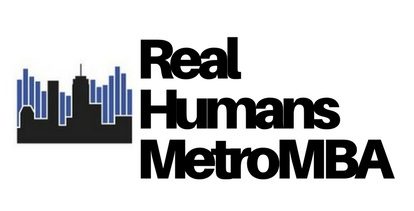
Of course, the history of a school may paint an overall setting, but it hardly tells the story of a current, individual student in the program. York Schulich MBAs stand out among many of Toronto’s stellar business schools, typically enrolling with a GMAT score of 660 and five years of professional work experience. As well, the York Schulich international community is well-represented, at 32 percent of the overall MBA class.
According to recent employment statistics provided by the school, Schulich MBAs typically earn about $91,500 CAD per year after earning their degree. In addition, about 89 percent of graduates earn employment just three months after graduating. Most grads earn roles in finance (23 percent), with marketing/sales (20 percent) and operations (18 percent) following closely.
To get a better feel for what life is really like for current York Schulich MBAs, we talked to a handful of students, including the manager of a long-standing luxury jewelry store, a theater major and performer, and a commercial lawyer looking for a brand new career challenge. Read on to see their stories and what the future may hold for life after an MBA.
Ohio State Remodels the Fisher Full-Time MBA Program
Just as 2018 draws to an eventful close, the Max M. Fisher College of Business at Ohio State University has announced a major remodeling of the Ohio State MBA.
The New Ohio State MBA
According to a new release from the school, the new Ohio State MBA “takes advantage of Fisher’s strong relationships with employers and recruiters to cultivate career competencies sought by organizations.”
Flexibility and tailoring the curriculum directly to student needs is the primary emphasis of the newer MBA model:
“Students will undergo an assessment at the beginning of their MBA experience to identify their strengths and skills gaps. Their program builds on these strengths to close the gaps so they earn an MBA that fits and distinguishes them in the marketplace.”
This MBA curriculum also “incorporates immersive, cross-functional projects with top companies and organizations locally and globally.” These changes include a Global Applied Projects to enhance international experience and exposure, a Business Lab Project to get hands-on experience with major local companies, and a Core Capstone Experience at the conclusion of the program.

Fisher College of Business Dean and John W. Berry, Sr. Chair in Business, Anil K. Makhija, says, “Continuous innovation is a priority which is explicitly highlighted in the college’s strategic plan. This innovation guides our approach to how all of our programs are delivered.”
Fisher’s full-time MBA Co-Director Roger Bailey, when discussing the new changes, says, “The data-driven approach to this redesign has yielded a full-time MBA program that is able to maximize the potential of each student. We are excited about how these many changes leverage Fisher’s strengths, and the increased value it will provide to our students, our alumni and the greater business community.”
News of the school’s changes to the full-time MBA come just one year after it adjusted its highly-regarded Working Professionals MBA; its part-time format counterpart. In 2017, Ohio State added a weekend option to the program, which previously only featured a weekday evening schedule.
The new Ohio State full-time MBA also arrives just 12 months after Fisher introduced its 10-month Specialized Master in Business Analytics program.
For more information on the recently revitalized Ohio State MBA and its other programs, head over to the official school website.
Online MBA
Rutgers Online MBA Program Structure
The flexible Rutgers Online MBA degree begins in the spring, summer, or fall and can be taken either part-time or full-time. The full-time curriculum typically takes two years to complete, while the part-time usually takes three.
Curriculum
Enrolled students have the opportunity to specialize in four different career focuses: data analytics; digital marketing; investment and private wealth management; and strategic leadership. The 54 credit program consists of three foundational courses, 11 core courses, and three elective courses.
Class Profile
Students in the program are usually around 33-years old and have at least 11 years of professional work experience. The entire RSBC Online MBA class consists of at least 250 students, around 45 percent of which are female.
Tuition, Scholarships, and Financial Aid
Tuition for the Rutgers Camden Online MBA is currently $1,256 per credit, which does not include an additional $300 online course fee. Over 54 credits the total tuition is $67,824.
Additional fees apply to all tuition rates.
Admitted students are eligible for a number of merit-based scholarships, based on academic record and GMAT scores. The school reports that several full-time students also work on a part-time, hourly basis for faculty members, although RSBC does not offer formal research assistantships.
Enrolled students may complete the FASFA in order to apply for federal and private loans. International students are advised to seek private loan opportunities or inquire about aid opportunities with their local government.
Admissions
Applicants to the Rutgers University-Camden Online MBA program are required to submit the following: the online application form, a $70 application fee, original undergraduate and graduate transcripts if applicable, two letters of recommendation, a personal statement of the applicant’s career objectives, GRE or GMAT scores, and a current résumé. Applicants who hold a graduate degree, such as a JD, MD, or Ph.D., are not required to send their standardized test scores to Rutgers. In addition to these materials, international applicants must submit their TOEFL, IELTS or PTE scores and a statement of financial documentation. Indian applicants should note that the RSBC admissions committee considers Division I or II bachelor’s degrees, earned in three years at “A” grade, NAAC-accredited college in India to be equivalent to a four-year degree.
International applicants for the Online MBA must follow the same standards, along with submission of reputable TOEFL, IELTS, or PTE scores and a statement of financial documentation.
GMAT waivers are available for all RSBC programs for qualified students.
Application deadlines are as follows:
For domestic students, applications are due August 1 for Fall, December 1 for Spring, and May 1 for Summer. For international students, the deadlines are June 1 for fall and November 1 for spring.
The Best Energy Industry MBA Programs in the U.S.
With the current shift in global economics that coincides with climate change, business schools have seen the benefit of educating students toward a sustainable future. Whether through influencing public policy, investing wisely in carbon reduction technologies, or developing businesses that serve to adjust to global warming, MBA grads with a focus within the energy industry have limitless career prospects.
The Best Energy Industry MBA Programs in the U.S.

The University of California, Berkeley Haas School of Business‘ Bay Area location (a center for innovation in sustainability) make it a clean energy industry leader. With an interdisciplinary approach that combines engineering, public policy, and law, Berkeley Haas MBA students have access to such initiatives as Cleantech to Market (C2M). This partnership between grad students, industry professionals, and researchers offers an annual symposium presenting the newest trends in clean technologies.
In C2M, professionals in such arenas as energy generation, storage, grid technology, and water purification guide students through past solutions. Students integrate their curriculum into real world solutions with the help of these professionals and leading researchers.

Cornell’s SC Johnson Graduate School of Management also offers a wealth of opportunities in the development of sustainable solutions for MBAs with the school’s immersion program, the Center for Social Enterprise. After receiving a sizable endowment in 2002, researchers and business leaders formed the SC Johnson Professorship in Sustainable Global Enterprise. Recently ranked 2nd overall by Bloomberg Businessweek, the sustainability curriculum at Johnson has achieved wide acclaim.
In addition, Johnson offers an Environmental Finance and Impact Investing Fellowship. With projects sponsored by corporate and government entities, students receive opportunities to work with the World Bank, Barclays, and The Water Initiative to address pressing issues in development and the increasing demand to find alternative energy sources.

UNC’s Kenan Flagler Business School offers an MBA that they consider “unique among major business schools.” The program, which exhibits a marked emphasis upon ROI, focuses on the energy value chain, and the intersection of oil and gas usage, renewables, and petrochemicals.
This degree focuses primarily on training future leaders in corporate sectors, power generation, renewable energy, investing firms, and consulting firms specializing in energy.

MIT’s Sloan School of Management takes an exemplary role in leadership development for the sustainable energy industry. According to Sloan’s Sustainability Initiative, the school “empowers leaders to act so that humans and nature can thrive for generations to come.” With a mission that includes a sustainability certificate, partnerships with NGOs and government agencies, and an ongoing lecture series, MIT Sloan offers a strong foundation in cleantech development.
In a recent roundtable, experts in renewable energy supply chain discussed potential solutions. These include wind farms and solar power for underserved populations.
“When you’re inside a startup and talking to your colleagues all the time, it’s easy to lose sight of the big picture,” says Sandhya Murali, a recipient of the Sustainability Certificate. “Being able to talk with experts in the field and share ideas with veterans in the industry was extremely helpful.”
Murali, ’15, is the CEO of the Solstice Initiative, which provides solar energy to communities in every economic strata.

Finally, University of Pennsylvania’s Wharton School of Business is at the forefront of energy efficiency, offering an MBA major in Business, Energy, Environment and Sustainability. Combining a focus in tech, regulation, finance, and business modeling trends, this degree prepares MBAs for leadership roles in energy, clean-tech investment, energy banking, consulting, government, and the sustainable non-profit industry.
Courses include Energy Markets and Policy, Energy Finance, Environmental Management, Law and Policy, Social Impact Marketing and Energy Law.
In addition, there is a dual degree option for Wharton MBAs. In which, students can combine an MBA with a Master in Environmental Studies for career opportunities in energy management.
From Disney to Starbucks, and More – Chicago News
Let’s explore some of the most interesting stories that have emerged from Chicago business schools this week.
Don’t Let Complacency Derail Your Career – Kellogg Insights
Carter Cast, the Northwestern Kellogg Clinical Professor of Innovation and Entrepreneurship and author of “The Right (and Wrong) Stuff: How Brilliant Careers Are Made — and Unmade,” writes about how “Version 1.0” employees who “lack curiosity and avoid taking risks” may find themselves professionally derailed.
“You have to find ways to stay fresh, especially in this day and age with the massive rate of change in technology. Disruption is everywhere.”
-
- Following a promotion, understand your supervisor’s expectations. “Ask the boss: ‘With this new job, what will I have done in two years to make you think that this was a good move to promote me? What are the key success metrics I should be aiming for?’”
- Increase your learning agility, or how quickly you develop and apply new skills by honing a discovery mindset. “[Force] yourself to acquire new skills that could help you down the road. If you work in sales, for example, you might take time to understand how the marketing team leverages its social marketing assets.”
- Identify your particular “area of innate resistance,” which Cast believes can stifle career growth if not addressed. He advises to spend more time being open to what you could learn than spending time and energy on what you already know.
- Cast advises Version 1.0 types to “adopt the ‘lean thinking’ mentality in order to refresh their thinking and test new ideas.”
- Networks that individuals can “rely on for information and assistance” are critical when jobs are constantly in flux. According to the article, “A strong, diverse network can help you bounce back after a challenge or shake-up.”
You can read more from the article here.
From Disney to Starbucks, Shewalter Doesn’t Shy Away From Big Challenges – Gies College of Business News
The U. Illinois Gies College of Business recently profiled Erik Shewalter (BADM ’14) who offers insights from his transition from Disney’s DTC streaming service to product management role at the Starbucks Rewards Innovation Team where he oversees strategy and innovation.
Shewalter spoke at length about a defining moment from his “once-in-a-lifetime” opportunity at the Disney-branded streaming service where he realized how much he loved the work he was doing.
“One of the defining moments of my career will forever be one of my first meetings with Kevin Mayer (Chairman of Direct-to-Consumer and International). I came to the meeting prepared, and because I was so immersed in the data, I was able to share specific insights that influenced decisions like the choice to include Star Wars and Marvel content in the streaming service.”
One major reason Shewalter left Disney for Starbucks was to work alongside his fiancée Naomi Liu (FIN, BADM ’15) who works in food innovation.
“There are so many little perks that materialize every day, such as sharing a commute, or even sharing our networks (which is critical for succeeding at Starbucks). Also, we love to surprise each other by bringing the other person drinks and snacks throughout the day.”
Check out the entire Gies College of Business News interview here.
Rogers Park and Edgewater Businesses Becoming More Sustainable with Loyola’s Help – Quinlan School of Business
With the support of Loyola University’s Quinlan School of Business Experiential Learning Communities in Solidarity program, professor Nancy Landrum orchestrated partnerships with Smack Dab Chicago and Edge of Sweetness Bakery for her Sustainable Business Management class.
Teams from Landrum’s class “performed waste, water, and simple energy audits and completed greenhouse gas inventories” and then organized “cash mob” events to attract customers to the businesses.
According to the article, “Edge of Sweetness saw a 216 [percent] increase in sales during the cash mob, and Smack Dab Chicago saw a 51 [percent] increase.”
Edge of Sweetness co-owner Kate Merrill (BSN ’96) writes, “I was delighted and surprised by how thorough they were during the initial evaluation. They were also very proactive about what they wanted to do with the projects, which was very nice to see.”
Smack Dab Chicago co-founder Axel Erkenswick adds, “I was interested to see how in-depth the students went into their audits, including going through our waste. Energy conservation is important to me, because it shows customers that we are more than a McDonald’s. We are community driven and put our efforts into helping the environment.”
Read more about the Quinlan program here.
Georgetown McDonough MBA Admissions Answers 5 Questions
In our latest installment of the MetroMBA “5 Questions” series, we speak with Shelly Heinrich, Associate Dean, MBA Admissions and Director of Marketing at Georgetown University’s McDonough School of Business. She was kind enough to respond to our questions and share insight into what it’s like to attend McDonough for an MBA.
1. How does Georgetown McDonough help MBA students pursue their special interests?
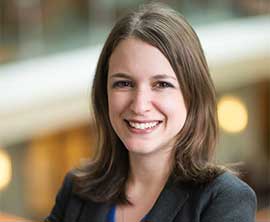
Shelly Heinrich, Associate Dean, MBA Admissions and Director of Marketing
“One of the reasons Georgetown McDonough stands out is because our students have diverse industry interest areas. We are not a school that places half in consulting and half in finance. While these certainly are the largest areas our students pursue, close to 53 percent are seeking careers in the following industries: technology, consumer products, healthcare, hospitality, manufacturing, nonprofit/social impact, real estate, and government. Technology, in particular, is our third highest career placement industry.
Another way students can pursue special interests is with our customizable curriculum. After students in our full-time and Flex MBA complete their core, they can choose from over 100 electives and don’t have to declare a concentration. We believe this is key because every job requires people to wear multiple hats and have multiple skill sets. So, if we were a school that forced students into certain classes, they wouldn’t be able to build a skill set that addresses the multiple knowledge gaps they are seeking to fill.
Additionally, MBA students can leverage the rest of Georgetown University, taking up to 12 credit hours of electives at another Georgetown graduate program or even 6 of those 12 credit hours at partner institutions in the DC metro area.”
2. What makes Georgetown McDonough a special place for you?

Overlooking the Washington Monument, located just one mile away from the Georgetown University McDonough School of Business campus.
“I experienced what makes Georgetown McDonough special even prior to starting to work here over four years ago. I’ve been living in the DC area for over ten years now and have worked at four other business schools. Throughout my professional and personal life, anytime I engaged with someone who worked, taught, or went to school at Georgetown McDonough, their eyes lit up or ‘sparked’ when talking about their experience. They spoke about their time as if they wanted to be back on campus, reliving their experience. When I received the offer to work here, a former staff member of McDonough reached out to me with congratulations and encouragement and said, ‘I loved my time there. It’s such a special place, and you’re going to love it.’
From day one, I have understood the spark. We have a phenomenal community. Students are high caliber, love their community, and embody the Jesuit values of men and women in service to others. Faculty and staff are committed to the continued growth of the program, and the evidence of this is our continued rise in rankings, the profiles of our incoming students, and our employment results. Also, our alumni are committed to giving back and helping fellow Hoyas.
Four years later, I still love coming to work every day. The buzz and energy of the Hariri building is invigorating and I am always excited to celebrate the weekly or even daily accomplishments of our community.”
3. What does your ideal MBA candidate look like?
“Our ideal candidate has executive presence, grit, diverse personal and professional life experiences, a global mindset, and a generosity of spirit. We want students who will come to Georgetown McDonough and leave a mark, finding their niche in the student community and leaving a legacy that will be experienced by future cohorts and classes.
But, to answer the question that your readers are likely looking for, we certainly look for students with a class profile similar to our recent incoming class. These are students with a strong academic background, professional and personal experiences that can add value to the classroom conversation, and a strong commitment to understanding and appreciating a diverse classroom experience. Our incoming Full-time and Evening MBA class represented over 40 countries and 17 industry backgrounds. The ideal candidate comes in wanting to learn from all the various backgrounds of students.”
4. Are there any new program, centers, faculty members, or events you can talk about?
“The Flex MBA program—the next evolution of our Evening MBA—will start in fall 2019. This program retains the strong assets of our highly ranked part-time MBA program while infusing newly added areas of flexibility.
We will retain an identical curriculum and degree as our full-time MBA and access to the same cohort format. The new aspects of the program include a Saturday elective and hybrid elective options, in addition to the current evening elective offerings. Hybrid electives allow for a mix of on-campus and virtual sessions to provide flexibility to students who may travel for work or who need options to commute less to campus. Additionally, there will be additional opportunities to take our Intensive Learning Experiences, which are 1-2 week intense electives where you complete an entire elective on a host of special topics in a condensed amount of time. Finally, we’re now allowing students to transfer electives of graduate coursework if they have not been counted toward another graduate degree.
We’ve seen strong interest in this program and look forward to the inaugural cohort next fall.
We recently launched a new Certificate in Consumer Analytics and Insights that provides students the opportunity to understand how consumers make decisions via the analysis of consumer data. For students wanting to hone their analytic skills, this is a very relevant certificate. Additionally, the HoyAlytics, student data analytics club is celebrating its one-year anniversary and has provided students with workshops in such programs as Tableau, R, SAS, and Excel.
Working with others across the university, Georgetown McDonough has launched a program to transform the lives of a highly select group of District residents released from local correctional facilities who show strong potential to become successful leaders and role models in their communities.
Through a combination of education and partnership with local employers, the university’s new Pivot Program aims to prepare participants for positions as both entrepreneurial leaders and productive employees.
The Pivot Program represents a collaboration among Georgetown’s Prisons and Justice Initiative, Georgetown College, and the McDonough School of Business, with the support from the Mayor’s Office on Returning Citizen Affairs and a $400,000 grant from the U.S. Department of Commerce’s Minority Business Development agency. In addition, the D.C. Department of Employment Services will provide stipends to our participants.
Georgetown designed the Pivot Program to break that cycle and recapture this untapped human capital. This transition program offers a non-credit-bearing certificate in business and entrepreneurship designed specifically for a cohort of up to 20 returning citizens, to be known as Pivot Fellows.”
5. What’s your favorite DC parade/event that every student should attend?

“I love the Embassy Open House Weekends in May; there are usually two consecutive weekends. Most embassies open their doors for a weekend of food, dancing, and cultural activities specific to their country. You can walk from embassy to embassy for an entire day of cultural immersion. It is something unique to D.C. that you wouldn’t get anywhere in the world. We have over 177 embassies in D.C. which is representative of what a global city we are.
Additionally, every student has to watch the 4th of July fireworks on the National Mall at least once while here. It is truly an U.S. American tradition and patriotic experience. Hot dogs, music, blankets, picnic baskets, and red, white, and blue.”
New Consulting Job Openings Are Flourishing at These Firms
Top MBA talent has made its way into prestigious consulting firms for decades, creating what we’ve previously called “a virtuous circle,” where the demand for this talent grows. With high starting salaries and the opportunity to work with a range of clients across many industries, new MBA jobs at consulting firms are always highly sought after. Here’s a look at some of the best new MBA jobs out there in the consulting world this week:
Business and Climate Change, and More – Boston News
Let’s explore some of the most interesting stories that have emerged from Boston business schools this week.
Is It Up To Business To Save the Planet? – MIT Sloan Ideas Made to Matter
The MIT Sloan Management Review recently hosted a debate between engineering professor and Center for Transportation and Logistics director Yossi Sheffi and Winston Eco-Strategies founder Andrew Winston. In which, the two discussed whether for-profit companies should have any obligations to reverse climate change.
Winston says, “There’s always been the easy wins: cutting energy, lighting, retrofits, manufacturing efficiencies, everything under ‘lean is green.’ But now you’ve got the entire clean economy, renewable energy area where it is now cheaper fundamentally to buy renewable energy than fossil fuels pretty much everywhere in the world.”
Sheffi counters that many businesses are doing the bare minimum because the cost in jobs, standard of living, and dislocation don’t “justify the means.” He argued that fast food chains, for instance, need to adopt firmer moral stances like banning burgers, but for major company’s like McDonald’s, it would be economic suicide.
You can read more from the interview here and check out the full video below.
Pushing Back on Hacks – Sawyer Business School Blog
Data breaches among American corporations (see: Equifax) have become so ubiquitous that they hardly make compelling news anymore. According to Sawyer Business School, “inadequate in-house expertise is the top reason [companies] are likely to have a data breach.”
Sawyer’s Information Systems and Operations Management (ISOM) department was developed in response to the emerging opportunities for cybersecurity professionals. ISOM Professor Benjamin Ngugi helped assemble a Cybersecurity Beanpot hackathon this past October to give students a chance to experience the challenges for themselves firsthand by earning $10,000 in scholarship money to hack a website called ShadowBank.
Ngugi says, “For students to be good, they need to really think like hackers. They need to understand some of the tools and techniques that cybercriminals use to really be good in protection. The piece that is missing is a real website that they can go and hack.”
Security Innovation CEO and President Ed Adams, whose software security company sponsored the hackathon, writes, “ShadowBank is a safe playground where people can come and practice offensive and defensive cybersecurity skills. The point is to make the site as real as possible so that people can become familiar with how to protect a site in the real world.”
With the career opportunities in cybersecurity projected to explode in the coming years, Ngugi wants every Sawyer student to have a foundation in the subject.
“Whether you’re in marketing, accounting, taxation, finance, or healthcare, you need to understand cybersecurity fundamentals, data privacy, and required compliance laws and regulations.”
You can read the full article here.
Insurers’ Nearly Invisible Negotiated Rates Can Dramatically Affect Health Care Prices – Questrom School of Business News
Questrom School of Business Professor Keith Ericson co-authored a new working paper that finds that the “rates that insurers negotiate with hospitals for specific procedures” has led to “significant variation in prices at different health care providers” for procedures like MRIs and hip replacements.
Ericson says, “[Until now] we didn’t know that there was a lot of variation between insurers’ [negotiated prices] at the same hospital. Many are concerned about hospitals being high priced versus low priced. But people should also be concerned about insurers being high-priced versus low-priced. We should think about price transparency options.”
Read the complete working paper “How Important is Price Variation Between Health Insurers?“ co-authored with Penn’s Stuart V. Craig and Northwestern’s Amanda Starc.
You can read more from the Questrom article here.
Check Out These New MBA Jobs at Top Food Companies
Soft drinks and coffee and cereal —oh my? When it comes to these products, American can’t get enough. More than $75 billion of soda is purchased every year, with multinational corporations leading the way in supplying goods to meet the worlds’ demands. Continue reading…

